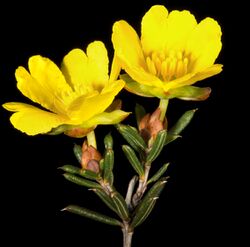Biology:Hibbertia uncinata
| Hibbertia uncinata | |
|---|---|

| |
| Scientific classification | |
| Kingdom: | Plantae |
| Clade: | Tracheophytes |
| Clade: | Angiosperms |
| Clade: | Eudicots |
| Order: | Dilleniales |
| Family: | Dilleniaceae |
| Genus: | Hibbertia |
| Species: | H. uncinata
|
| Binomial name | |
| Hibbertia uncinata (Benth.) F.Muell.[1]
| |
Hibbertia ulicifolia is a species of flowering plant in the family Dilleniaceae and is endemic to the south-west of Western Australia. It is an erect shrub that typically grows to a height of 0.2–1 m (7.9 in–3 ft 3.4 in).[2]
It was first formally described in 1863 by George Bentham who gave it the name Candollea uncinata in Flora Australiensis from specimens collected by James Drummond.[3][4] In 1882, Ferdinand von Mueller changed the name to Hibbertia uncinata in his Systematic Census of Australian Plants.[5] The specific epithet (uncinata) means "hooked", referring to the leaves.[6]
This hibbertia grows on slopes, hills and floodplains in the Avon Wheatbelt biogeographical region of south-western Western Australia.[2]
Conservation status
Hibbertia uncinata is classified as "not threatened" by the Western Australian Government Department of Parks and Wildlife.[2]
See also
References
- ↑ "Hibbertia uncinata". Australian Plant Census. https://biodiversity.org.au/nsl/services/apc-format/display/91299.
- ↑ 2.0 2.1 2.2 "Hibbertia uncinata". FloraBase. Western Australian Government Department of Parks and Wildlife. https://florabase.dpaw.wa.gov.au/browse/profile/5175.
- ↑ "Candollea uncinata". APNI. http://id.biodiversity.org.au/instance/apni/536900.
- ↑ Bentham, George (1863). Flora Australiensis. 1. London: Lovell Reeve & Co.. p. 46. https://www.biodiversitylibrary.org/item/3669#page/104/mode/1up. Retrieved 6 December 2021.
- ↑ "Hibbertia uncinata". APNI. http://id.biodiversity.org.au/instance/apni/513339.
- ↑ Sharr, Francis Aubi; George, Alex (2019). Western Australian Plant Names and Their Meanings (3rd ed.). Kardinya, WA: Four Gables Press. p. 331. ISBN 9780958034180.
Wikidata ☰ Q17395457 entry
 |

